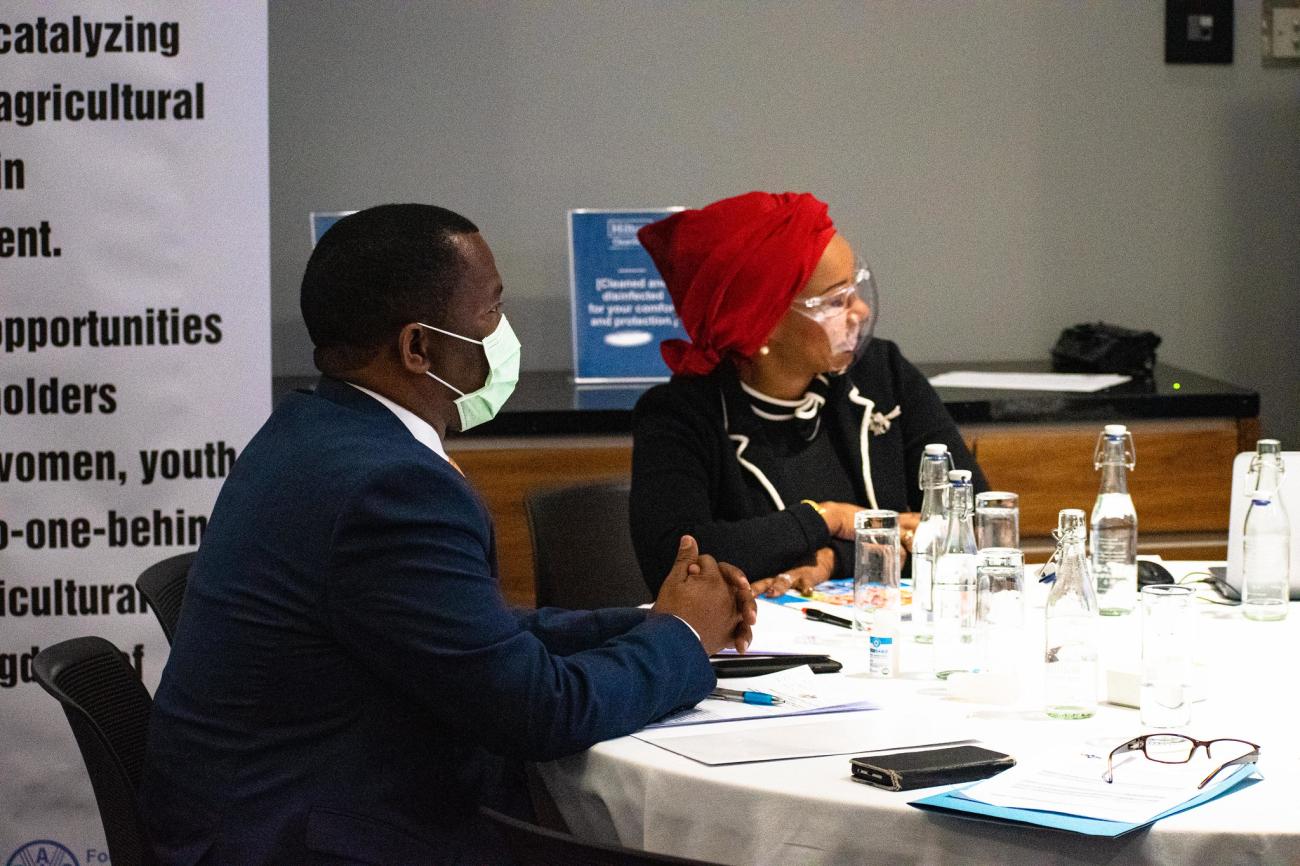Agriculture consultative indaba kicks off on a high note

Ministry of Agriculture facilitates multistakeholder consultative forum on the status of agriculture in Eswatini
On the 15th June 2021, a three-day multistakeholder consultative Indaba on the state of agriculture in Eswatini kicked off on a high note with over 200 participants joining the meeting virtually and physically at the Hilton Gardens Hotel in Mbabane.
Organised by the Ministry of Agriculture, with support from the United Nations Food and Agriculture Organisation (FAO), the consultative meeting is part of the Agrinvest initiative which seeks to establish an Agriculture Development Fund, Sector-based Development Plans as well as facilitate the creation of Industry-based Associations for farmers, especially those at smallholder level.
Minister of Agriculture, Hon. Jabulani Mabuza, who officially opened the meeting, stated that the purpose of the Indaba was to carry out a wide review and seek a consensus on the Agrinvest tools and institutions that are proposed to transform the food and agriculture sector. The Minister expressed confidence that the initiatives under Agrinvest would result in transformative change, while acknowledging that the perils of food insecurity, poverty and unemployment still persist despite previous investments. “I am sure you are all witnesses to the fact that our country has adequate land and water resources to produce enough for local consumption and export to global markets,” he said. “All that is required is to improve the coordination of value chain players and build trust, to ensure that all of us; government, private sector, farmers and markets complement each other to supply and meet the food demand.”
The Agrinvest initiative leverages private investments in agri-food systems by assisting the Government to deploy measures that create an enabling environment, conducive regulatory conditions and network of institutions to enable the private sector, including smallholder farmers, to perform investments that are compliant with the Sustainable Development Goals (SDGs), generate jobs, food and nutrition security, substitute imports and increase exports.
In her remarks, the UN Resident Coordinator, Ms. Nathalie Ndongo-Seh, noted that agriculture is among the three sectors expected to lend greater impetus to recovery from the devastating impacts of the COVID-19 pandemic. The other sectorsare manufacturing and construction. The agricultural sector, as it contributes to several SDGs, has the potential of leaving no-one behind and lifting out of poverty and hunger women and girls, orphans and child headed households, rural poor populations, the youth, persons with disability, persons living with HIV and AIDS, migrants and other vulnerable groups at risk of being left further behind. “I hope your deliberations will come up with recommendations on how the Eswatini economy will recover better from the challenges brought by the pandemic while also addressing issues such as youth employability and youth entrepreneurship in the agricultural sector,” she said.
The UN Resident Coordinator also expressed appreciation for the involvement and the level of participation of smallholder farmers in the consultative forum, noting that they are better positioned to bring transformative change that will ensure that the country produces enough food for its citizens and takes advantage of export markets. “We need your voices to be heard, so that we can find lasting solutions to ending hunger, achieving food security and improved nutrition, and promoting sustainable agriculture,” she said.
FAO Sub Regional Coordinator for Southern Africa and Representative for Eswatini, Dr Patrice Talla, informed the meeting that FAO is supporting countries, including Eswatini, to develop their second generation of National Agricultural Investment Plans. The initiative prepares countries to meet their Malabo commitments to ensure that all programmes relating to agriculture are coordinated and aligned with the Malabo commitments. “A key characteristic of the second generation of investment plans is that they are not just simple documents, but a combination of documents, network of structured instruments and institutions that are fit for purpose,” he said.
The Malabo Declaration on Accelerated Agricultural Growth and Transformation for Shared Prosperity and Improved Livelihoods is a set of new goals showing a more targeted approach to achieve the agricultural vision for the continent which is shared prosperity and improved livelihoods. It was signed by Heads of State and Governments at African Union Summit in Malabo, Equatorial Guinea in June 2014. One of the commitments of the Declaration is the allocation of at least 10% of public expenditure to agriculture.
The consultative meeting also feeds into the UN global Food Systems Summit to be convened by the UN Secretary General, Mr. Antonio Guterres in September. The Summit aims to maximise the co-benefits of a food systems approach across Agenda 2030, that mees the challenges of climate change. The Summit aims to provide a platform for new ambitious actions, innovative solutions, and plans to transform food systems and leverage these shifts to deliver progress across all the SDGs. Principal Secretary in the Ministry of Agriculture, Mr Bongani Masuku, is the convener of on-going national level dialogues being carried out with the support of the United Nations through FAO, IFAD, WFP and WHO.
The consultative meeting will end on Thursday, 17 June 2021, following deliberations that are organized in selected value chains, including baby vegetables, cotton, fruit trees, livestock and others.













